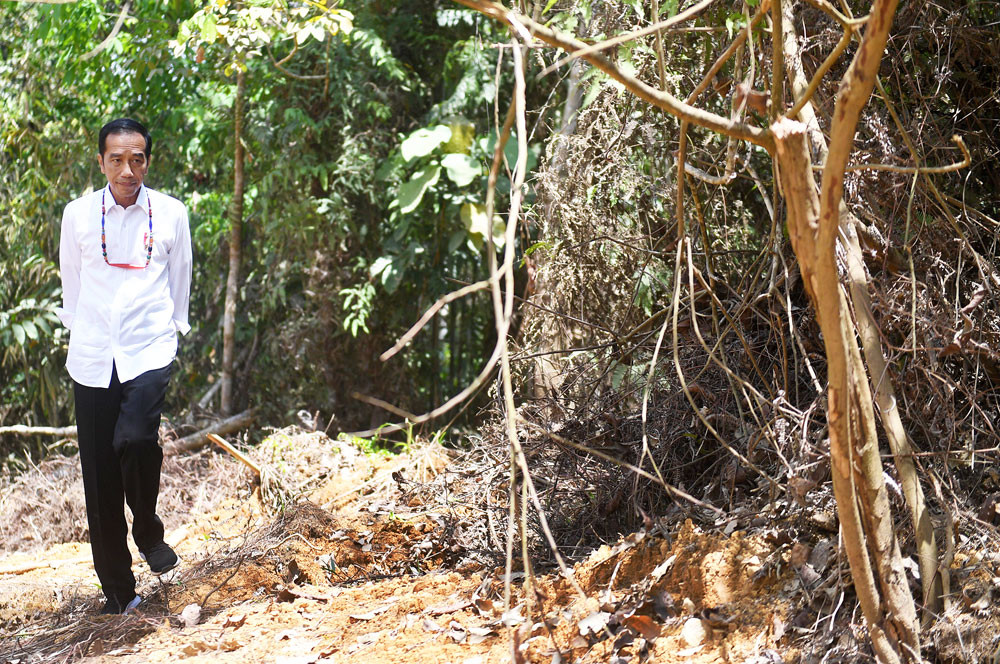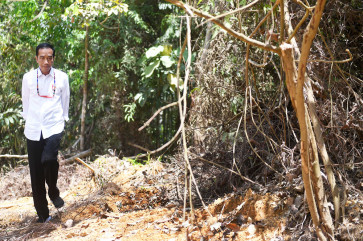Popular Reads
Top Results
Can't find what you're looking for?
View all search resultsPopular Reads
Top Results
Can't find what you're looking for?
View all search results$33b infrastructure project: New capital
Jakarta’s shortcomings as a capital are obvious: It has headline-grabbing problems with congestion, pollution, and land subsidence. Moving the capital alone will not solve any of these problems, as Jakarta continues to grow; and will remain Indonesia’s business center. The move is more about shifting economic activity and addressing “infrastructure gaps” by creating a new administrative hub outside of Java and Sumatra.
Change text size
Gift Premium Articles
to Anyone
P
resident Joko “Jokowi” Widodo is embarking on his biggest infrastructure project yet, with Aug. 26 marking the unveiling of his plan to build a brand-new national capital in East Kalimantan province. The estimated cost to relocate the capital is US$33 billion and officials say construction will start in 2020. Jokowi’s push to move the capital is bold and seals his reputation as Indonesia’s “infrastructure president”.
Jakarta’s shortcomings as a capital are obvious: It has headline-grabbing problems with congestion, pollution, and land subsidence. Moving the capital alone will not solve any of these problems, as Jakarta continues to grow; and will remain Indonesia’s business center. The move is more about shifting economic activity and addressing “infrastructure gaps” by creating a new administrative hub outside of Java and Sumatra.
If Indonesia’s economic activity is spread unevenly across the archipelago, so are its infrastructure projects. Not surprisingly, Java and Sumatra have the highest concentration, dotted with numerous road, highway and toll road projects to help smooth the movement of millions of people and goods. East Kalimantan, on the other hand has railways planned and a toll road between the cities of Balikpapan and Samarinda under construction near the proposed site. Building a new city will necessitate upgrading existing infrastructure and the planning of dozens of new projects in the province.
Such a large building campaign comes as infrastructure emerges as a new front in the Indo-Pacific region’s geopolitical rivalries. Governments in the region have launched a number of seemingly competing infrastructure and connectivity initiatives since 2015. These include national programs led by major countries like China’s Belt and Road Initiative (BRI) and Japan’s Partnership for Quality Infrastructure (PQI). Multilateral development banks are major actors in infrastructure. The World Bank and Asian Development Bank have long provided much-needed capital and technical assistance in Indonesia, while the China-led Asian Infrastructure Investment Bank is a newcomer.
A big question hangs over how the Indonesian government will involve these initiatives in the construction of the new capital. Indonesia has invited China’s BRI to invest in projects in adjacent North Kalimantan province, in particular a $17.8 billion hydropower project. BRI is known for its willingness to pursue projects in challenging regions, but the initiative has suffered from reputational problems in Indonesia. The Jakarta-Bandung high-speed rail, BRI’s flagship project in Indonesia, has failed to meet deadlines and officials have begun to view the management of the project as nontransparent.
Indonesian firms will likely be the first to break ground in East Kalimantan next year. Especially state-owned enterprises (SOEs), currently building and managing 80 percent of infrastructure projects. Using SOEs is a convenient way to expedite new projects because the government often has direct influence over the firm. It also bypasses slow processes like project proposal design and competitive tendering.
Relying on SOEs to lay the foundations for a new city in a comparatively remote region like East Kalimantan has its drawbacks. Overreliance crowds out much-needed private investment and undermines the benefits of competition among contractors. Indonesia’s business community has echoed these sentiments.


















